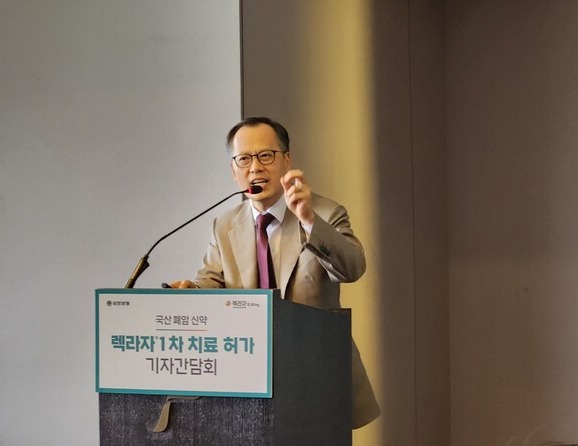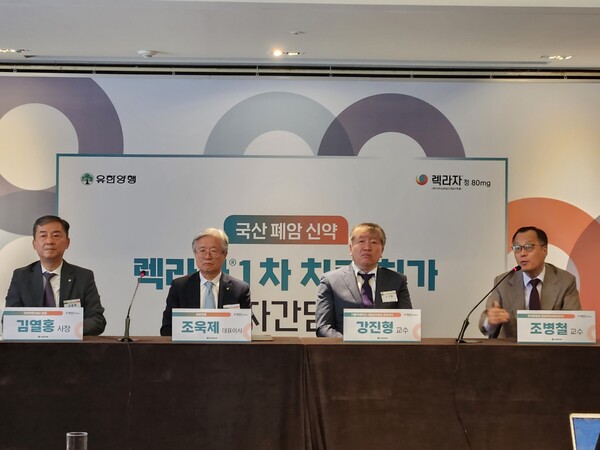Leclaza (ingredient: lazertinib) demonstrated consistently strong progression-free survival (PFS) outcomes in both global and domestic clinical trials, with its particular ability to be used as a first-line treatment for epidermal growth factor receptor (EGFR) mutated non-small cell lung cancer (NSCLC), Yuhan Corp. said.
In a press conference in Seoul on Monday, the company celebrated Leclaza’s achievement. On June 30, the FDA expanded Leclaza’s indication to include the first-line treatment in locally advanced or metastatic NSCLC patients who have an EGFR exon 19 deletion or exon 21 (L858R) substitution mutation.

The median progression-free survival (mPFS), the primary endpoint, was 20.6 months in the global and Asian studies and showed a small difference of 20.8 months in the Korean study. Correspondingly, hazard ratios were also similar at 0.45, 0.46, and 0.41 respectively.
Professor Cho Byoung-chul of Medical Oncology at Yonsei University College of Medicine said the phase 3 clinical trial, LASER301, showed superior results consistent across EGFR mutation types, exon 19 deletions, and exon 21 (L858R) compared to AstraZeneca’s Iressa (gefitinib).
"We are especially pleased that Leclaza demonstrated superior antitumor activity in patients with the L858R substitution, which is known to have a relatively poor prognosis compared to patients with exon 19 deletion mutations, meaning that the results were consistent regardless of EGFR mutation type," said Cho.
Regarding the adverse effects, there is no perfect medicine but what is important is that adverse effects need to be manageable and still exhibit a therapeutic effect, he said.
Leclaza’s most common adverse effects were paresthesia, skin rash, and diarrhea which are also common side effects of other similar drugs, according to Cho.
“What’s more important is that we clinicians are very familiar with treating these side effects so it is not a huge concern.”
Professor Kang Jin-hyoung of Medical Oncology at the Catholic University of Korea Seoul St. Mary's Hospital also mentioned the benefits of Leclaza treatment for Korean patients confirmed in the LASER301 clinical trial.
“This is the first third-generation EGFR TKI to include a large number of Korean patients in a clinical trial and demonstrate benefit,” Professor Kang said.
The LASER 301 study included a total of 172 Korean patients, and one-third of them had brain metastasis before the start of the clinical trial.

He added that the significant PFS benefits of Leclaza were consistently shown in the subgroup of patients with brain metastasis, and the safety data were also consistent with the previously reported safety profiles.
Reinforcing the company’s commitment to patients and intention to make Leclaza a global blockbuster drug, Yuhan Corp. CEO Cho Wook-je said the company plans to provide patients free access to Leclaza through the Early Access Program (EAP) without a limit until the drug is approved by insurance.
“Few companies are willing to step out with an EAP program at the request of patients,” said Cho. “We did the same when Leclaza was approved as a second-line treatment and are happy to make Leclaza immediately available as a first-line treatment for patients with confirmed EGFR mutated NSCLC.”
Related articles
- Yuhan's Leclaza indication expanded as 1st-line NSCLC treatment
- Yuhan USA prepares for ‘next Leclaza’ in bio’s mecca of Boston
- Yuhan acquires J INTS BIO’s TKI to develop first-in-class NSCLC drug
- Leclaza shows benefits of homegrown new drug
- Yuhan's NSCLC drug Leclaza passes first hurdle for reimbursement expansion

